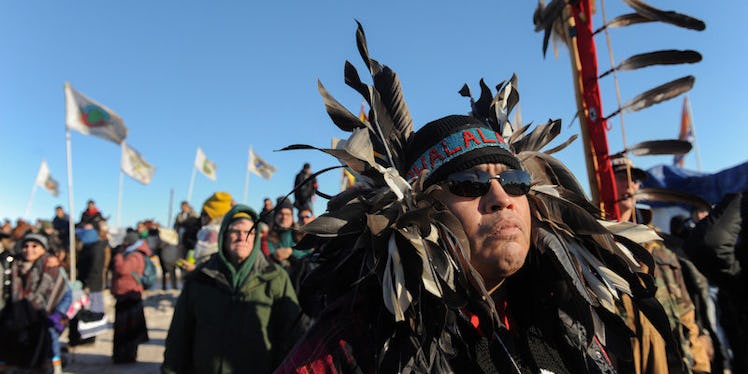
Dakota Access Pipeline Has Been Halted By The US Army Corps Of Engineers
The incredibly controversial Dakota Access Pipeline construction has been called to a halt.
The US Army Corps Of Engineers will explore alternative routes following pleas from the Obama Administration and endless protesting, according to a statement released today by campaign group Stand With Standing Rock.
The Corps will undertake an environmental study to explore the impact of alternative routes in other areas.
For those who have been protesting for about five months now -- even during the Thanksgiving holiday -- this comes as a huge victory.
The protests have been highly controversial for the often inhumane treatment of protestors by militarized police forces. In addition to being shot with rubber bullets and sprayed with cold water in freezing temperatures, protestors have also been placed in "kennel-like" holding cells.
Standing Rock Sioux Tribal Chairman Dave Archambault II said,
Today, the US Army Corps of Engineers announced that it will not be granting the easement to cross Lake Oahe for the proposed Dakota Access Pipeline. Instead, the Corps will be undertaking an environmental impact statement to look at possible alternative routes. We wholeheartedly support the decision of the administration and commend with the utmost gratitude the courage it took on the part of President Obama, the Army Corps, the Department of Justice and the Department of the Interior to take steps to correct the course of history and to do the right thing.
Though there is fear the pipeline construction could begin again once president-elect Trump takes office and the study is over, the Sioux Tribe is marking this as a huge win.
Archambault II continued,
We hope that Kelcey Warren, Governor Dalrymple and the incoming Trump administration respect this decision and understand the complex process that led us to this point. When it comes to infrastructure development in Indian Country and with respect to treaty lands, we must strive to work together to reach decisions that reflect the multifaceted considerations of tribes.
The Dakota Access Pipeline would have spanned 1,170 miles from North Dakota to Illinois.
The Army is currently exploring other options for pipeline routes.